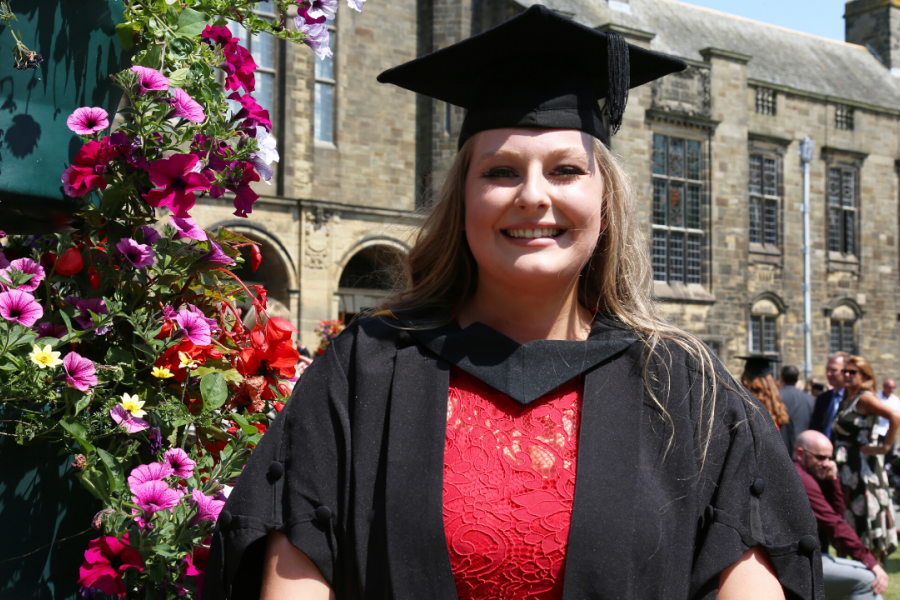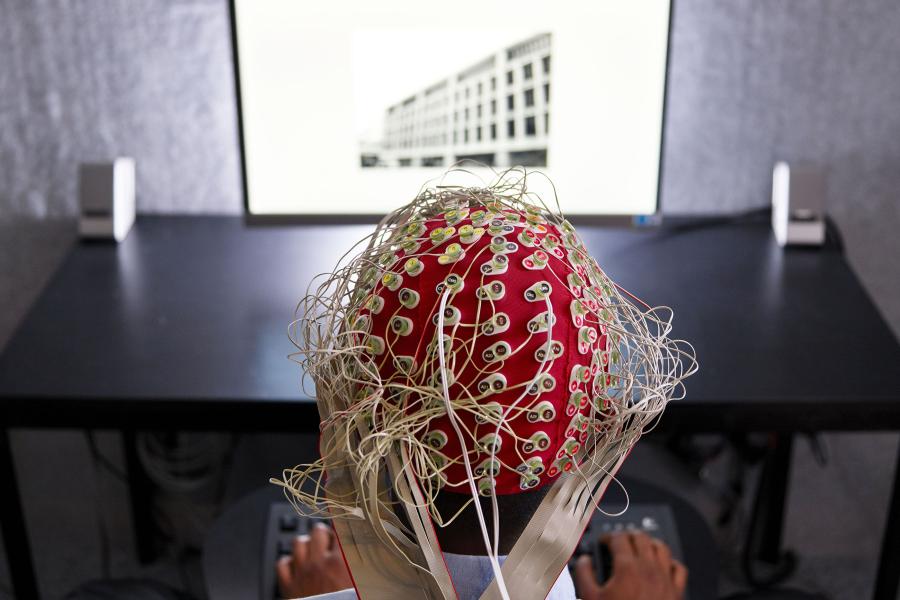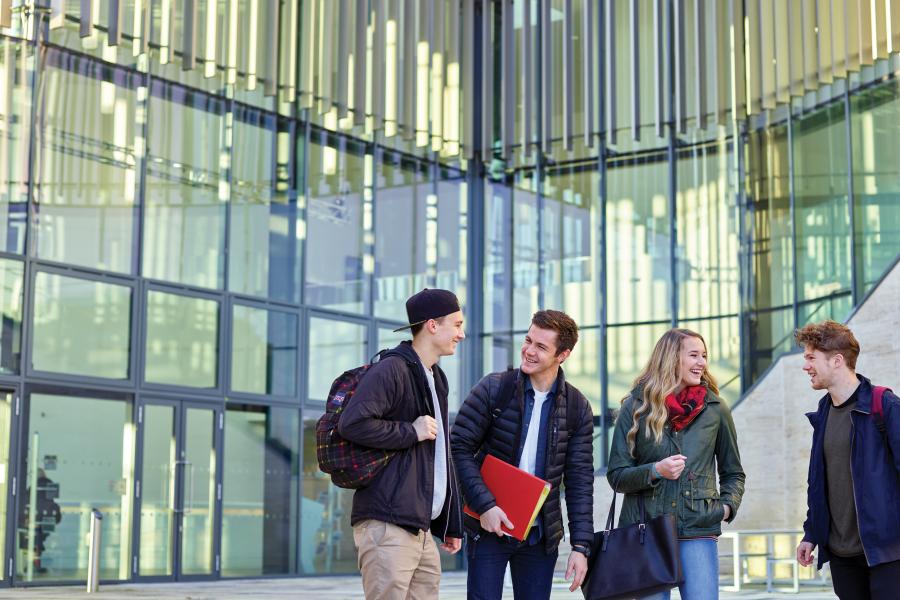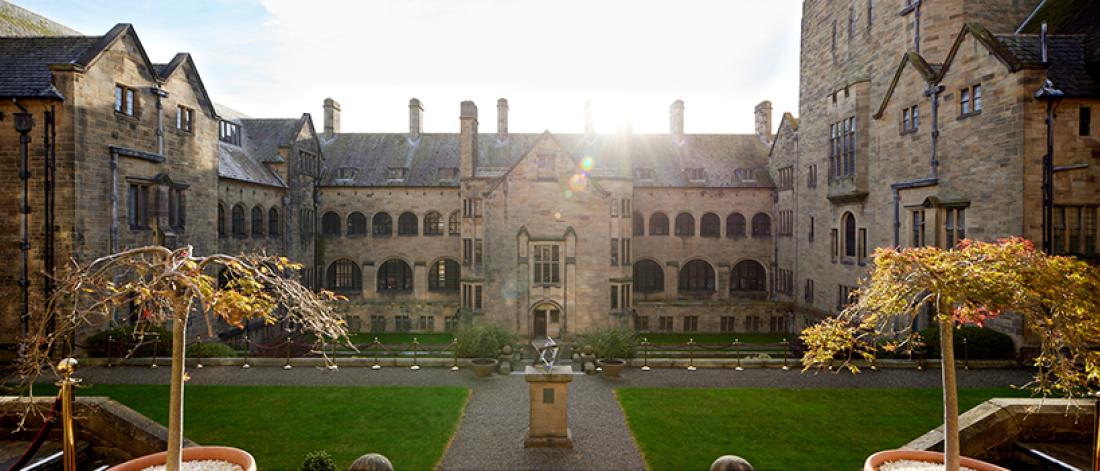About This Course
On this Linguistics and Psychology joint honours degree, you will learn about behaviour from infancy to old age, and deal with the biological, social and individual factors that affect human psychology and language use.
Studying linguistics will enable you to learn about, understand and interpret many aspects of human language. On this Linguistics and Psychology course, you will study the ‘science’ behind language, including possible sounds used in speech and their combination (phonetics, phonology), how words are built up morphology), what distinguishes sentences from just strings of words (syntax), meaning (semantics and pragmatics), the effect that society, culture and norms have upon language use (sociolinguistics) and how languages change over time.
Linguistics is the study of how language works and how and why language is used. Linguists look at not only how people learn, understand and speak language, but also at the way different people use language differently. Linguistics has a theoretical dimension but also an applied dimension – such as language technology, language policy and language in education.
You will also have the opportunity to learn about the ways in which different languages are different or similar in terms of their grammar, how society and language go hand-in-hand, and the functions and status that different languages have across the world.
Psychology is the scientific study of how people behave, feel, think and learn. As a science and as a profession, Psychology makes a difference to people in the real world, by improving quality of life across a wide range of areas.
In Psychology, you will study the mind, thought and behaviour, and you will learn about how to describe and explain how people live, think, socialize and develop. You will get the opportunity to find about things like: the factors that govern human psychological behaviour, how our environment influences our thoughts and feelings, how children’s minds develop and change as they grow older, and about research methods and advances in the field of psychology.
Why choose Bangor University for this course?
- Teaching staff are key researchers with specialisms in areas such as bilingualism, child language acquisition and language disorders.
- You will gain a sound and scientific insight into the structure and use of language and human behaviour as well as a sound and scientific insight into the structure and use of language, its history and the relationship between language and society.
- We are a vibrant, accessible, friendly department with staff committed to high-quality teaching, excellent student experience, strong pastoral support, and the integration of current cutting-edge research and topics into your lectures throughout the duration of your studies. We are also dedicated to ensuring that our Linguistics and Psychology students develop excellent skills in critical thinking, data analysis, presentation and independent research to enhance their employability upon graduation.
- Our teaching staff are also active researchers in a range of applied and theoretical areas relating to Linguistics, English Language and Psychology - many have international reputations in the field.
- Our state-of-the-art learning facilities include a professional grade sound / recording studio (our Speech laboratory), an eye tracking laboratory, and an event-related potential (ERP) laboratory and a corpus-linguistics resource facility. We also have audio and video equipment that can be checked out for field work. Our facilities also include an extensive collection of books on Linguistics and English Language and a language library which is maintained by our undergraduate student association - the Bangor Linguistics Society (BLS).
Additional Course Options
This course is available with a Placement Year option where you will study for 1 additional year. The Placement Year is undertaken at the end of the second year and students are away for the whole of the academic year.
The Placement Year provides you with a fantastic opportunity to broaden your horizons and develop valuable skills and contacts through working with a self-sourced organisation relevant to your degree subject. The minimum period in placement (at one or more locations) is seven calendar months; more usually you would spend 10-12 months with a placement provider. You would normally start sometime in the period June to September of your second year and finish between June and September the following year. Placements can be UK-based or overseas and you will work with staff to plan and finalise the placement arrangements.
You will be expected to find and arrange a suitable placement to complement your degree and will be fully supported throughout by a dedicated member of staff at your academic School and the University’s Careers and Employability Services.
You will have the opportunity to fully consider this option when you have started your course at Bangor and can make an application for a transfer onto this pathway at the appropriate time. Read more about the work experience opportunities that may be available to you or, if you have any questions, please get in touch.
This course is available with an International Experience Year option where you will study or work abroad for 1 additional year. You will have ‘with International Experience’ added to your degree title on graduating.
Studying abroad is a great opportunity to see a different way of life, learn about new cultures and broaden your horizons. With international experience of this kind, you’ll really improve your career prospects. There are a wide variety of destinations and partner universities to choose from. If you plan to study in a country where English is not spoken natively, there may be language courses available for you at Bangor and in your host university to improve your language skills.
You will have the opportunity to fully consider this option at any time during your degree at Bangor and make your application. If you have any questions in the meantime, please get in touch.
Read more about the International Experience Year programme and see the studying or working abroad options on the Student Exchanges section of our website.
Course Content
This Linguistics and Psychology course will be taught by a combination of lectures, tutorials and/or seminars, depending on the module and level. You will choose 120 credits of modules relating to Linguistics and/or Psychology each year, where you start by learning the foundational knowledge required to study in this field in the different subdisciplines, proceeding to more in-depth intermediate-level study before choosing what areas to specialize in. Modules are assessed on the basis of different kinds of coursework, including essays, reports, oral presentations, tests, exams, data analysis, etc. You will do a dissertation in your final year which represents a research project which you will undertake under the supervision of a member of academic staff.
Modules for the current academic year
Module listings are for guide purposes only and are subject to change. Find out what our students are currently studying on the Linguistics and Psychology BA (Hons) Modules page.
Course content is for guidance purposes only and may be subject to change.
Facilities
Linguistics facilities
- We have state-of-the-art learning facilities which include a professional grade sound / recording studio (our Speech laboratory), an eye tracking laboratory, and an event-related potential (ERP) laboratory and a corpus-linguistics resource facility. We also have audio and video equipment that can be checked out for field work.
- Our facilities also include an extensive collection of books on Linguistics and English Language and a language library which is maintained by our undergraduate student association - the Bangor Linguistics Society (BLS).
Psychology facilities
Throughout your degree, you’ll have the opportunity to access these facilities as participants in research projects, and you’ll be involved in some of these facilities as researchers during your project in the third year.
Psychology has its own research dedicated MRI/fMRI Philips Elition 3T Magnetic Resonance Imaging (MRI) scanner. Our new research-dedicated scanner was installed in summer 2019 in the main psychology building. This scanner offers cutting-edge MR imaging technique and includes MRI-compatible eye-tracking and capacity for in-scanner EEG recordings, and a nearby mock scanner to support training studies and work with children. The scanner is also equipped for 4D cardiac, diffusion tensor imaging (DTI), and magnetic resonance spectroscopy (MRS). As an example of how you may experience the scanner, apart from as a research participant, is that 3rd-year undergraduate students doing their project within Dr Koldewyn’s lab have been involved in studies involving the brain response to observed social interactions, including data collection and analysis of developmental data from primary-aged children.
Expertise in electrophysiological methods (EEG/ERP) is a particular strength in the School. The Psychology Open-access Electroencephalography and Topography (POET) lab consists of a fully shielded sound-attenuated testing booth, 128 channel BioSemi EEG system, and all equipment necessary for auditory and visual EEG/ERP experiments, with synchronized remote eye-tracking. Apart from opportunities to be involved as a research participant, undergraduate students in the 3rd year have had the opportunity to be actively involved in EEG/ERP lab for their 3rd year project.
Currently, the POET lab is used to investigate a diverse range of topics such as:
- machine learning to predict motor sequences from EEG activity
- social development and self-perception in infants
- development of single EEG trial analyses to compare language processing in typical and developmentally challenged groups.
The Brain Stimulation Lab is equipped with two different types of stimulation equipment, transcranial magnetic stimulation (TMS) and transcranial direct current stimulation (tDCS). Transcranial magnetic stimulation (TMS) is a non-invasive technique that uses strong magnetic fields to briefly interrupt the processing of nerve cells in a small area of the underlying surface of the brain. An electrical current is passed very briefly through the stimulator device - a coil of copper wires (encased in plastic) held on the surface of the scalp. This current induces a magnetic field around the coil that, in turn, induces an electrical current in the underlying nerve cells on the surface of the brain. While the nerve cells are being stimulated, and for a few 10ths of a second afterward, they cannot perform their normal functions. This does not cause damage or injury to the nerve cells.
The second type of stimulation is called transcranial direct current stimulation (tDCS), and like the TMS, it is non-invasive and painless, and uses low-intensity electrical currents to excite or inhibit neuronal activity in specific parts of the brain. Both of these systems have been interfaced in experiments with equipment for eye-tracking, electromyography (EMG), electroencephalography (EEG), and for kinematic recording.
Psychology houses a number of motion capture labs for capturing of complex full body and limb motion for research with equipment including a Polhemus motion capture system (16-channels) that enables us to study skilled actions with high spatio-temporal precision.
Some recent examples of activity within these labs include Prof. Robert Ward investigating how body motion information is perceived by observers, and to what extent this information is reliable or deceptive. Dr. Koldewyn has used the systems to record search patterns during a physical search task designed to explore how quickly children learn where a target object is likely to be, and how that learning is influenced by observing others. 3rd-year project students were involved in designing the study and in collecting data from primary-aged children.
In addition to open-access shared facilities, the school has highly specialised facilities dedicated to specific academics such as:
- several dedicated EEG labs in addition to our open-access facility
- two sound-proofed labs for auditory studies
- virtual-reality (VR) and augmented-reality (AR) robotically controlled force-feedback systems
- mobile eye and pen tracking for studies of literacy development in schools and the lab
- a food and psychopharmacology lab including hardware and software for specialised food dispensing machine
- video analysis suite for children’s cardio-respiratory fitness and fundamental movement skills
- MRI-compatible force transducer keyboard (10-channels) to record bimanual finger presses continuously including preparatory and mirror movements
- Transcranial Doppler Sonography lab to allow for measurement of blood flow into each half of the brain.
The School shares University and College-wide licensing for Qualtrics and Pavlovia platforms to facilitate online research.
Several participant panels are available to help researchers in the School of Psychology recruit participants. As a psychology student you’ll be involved in the student panel (SONA) and in total our students participate in about 4000 hours of research overall each year.
We also maintain specialised participant panels which may form part of your third-year project:
- Neurological patient panel, in collaboration with the NHS.
- Learning disorders panel: focused on Dyslexia (in cooperation with our Miles Dyslexia Centre) and including other learning disorders in adult participants
- Community Participant Panel: These are helpful for identifying Bilinguals, People with Dyslexia, and the Elderly, and particularly for recruiting matched controls for patient case studies, and for providing a pool of bilingual Welsh/English participants.
- Infant/ Child Development Database
Psychology researchers studying child development benefit from a close relationship with Bangor’s Tír na nÓg Nursery. The nursery provides a unique resource for researchers in the Clinical, Health, and Behavioural Psychology and Language, Bilingualism, and Cognitive Development Research groups. Tír na nÓg is equipped with special facilities, such as an observation lounge and video cameras. Subject to the consent of the children’s parents or guardians, observations can be made to further understanding of language, learning, and development.
General University Facilities
Library and Archive Services
Our four libraries provide a range of attractive study environments including collaborative work areas, meeting rooms and silent study spaces.
We have an extensive collection of books and journals and many of the journals are available online in full-text format.
We house one of the largest university-based archives not only in Wales, but also the UK. Allied to the Archives is the Special Collections of rare printed books.
Learning Resources
There is a range of learning resources available, supported by experienced staff, to help you in your studies.
The University’s IT Services provides computing, media and reprographics facilities and services including:
- Over 1,150 computers for students, with some PC rooms open 24 hours a day
- Blackboard, a commercial Virtual Learning Environment, that makes learning materials available on-line.
Course Costs
General University Costs
Home (UK) students
Information on fees and finance for Home (UK) students
International (including EU) students
Additional Costs
There are also some common additional costs that are likely to arise for students on all courses, for example:
- If you choose to study abroad or take the International Experience Year as part of your course.
- If you attend your Graduation Ceremony, there will be a cost for gown hire (£25-£75) and cost for additional guest tickets (c.£12 each).
Course-specific additional costs
Depending on the course you are studying, there may be additional course-specific costs that you will be required to meet. These fall into three categories:
- Mandatory Costs: these are related to a particular core or compulsory module that you’ll be required to complete to achieve your qualification e.g. compulsory field trips, uniforms for students on placement, DBS Check.
- Necessarily Incurred Costs: these may not be experienced by all students, and will vary depending on the course e.g. professional body membership, travel to placements, specialist software, personal safety equipment.
- Optional Costs: these depend on your choice of modules or activity and they are shown to give you an indication of the optional costs that may arise to make sure your choice is as informed as possible. These can include graduation events for your course, optional field trips, Welcome Week trips.
Entry Requirements
Offers are tariff based, 96 - 128 tariff points from a Level 3 qualification* e.g.:
- A Levels: A science subject (e.g. Maths, Biology, Human Biology, Physics, Chemistry, Statistics, Psychology, Science) preferred but not required. General Studies and Key Skills not normally accepted.
- BTEC National Extended Diploma: MMM - DDM
- Cambridge Technical Extended Diploma: MMM- DDM
- City & Guilds Advanced Technical Extended Diploma (1080): considered on a case-by-case basis
- International Baccalaureate Diploma: grade H5 in English Literature/Language and grade H5 in a Science subject preferred but not required
- Access: pass required
- Welsh Baccalaureate: We will accept this qualification in conjunction with other level 3 qualifications
- T Levels: T Levels in a relevant subject considered on a case-by-case basis
- Extended Project Qualification: Points can include a relevant Extended Project (EPQ) but must include a minimum 2 full A-levels, or equivalent.
We are happy to accept combinations of the qualifications listed above, as well as alternative Level 3 qualifications such as City & Guilds, Access and Cambridge Technical Diplomas.
We also welcome applications from mature learners.
International Candidates: International Candidates: school leaving qualifications that are equivalent to A levels/Level 3 and/or college diplomas are accepted from countries worldwide (subject to minimum English Language requirements). More information can be found on our International pages.
*For a full list of accepted Level 3 qualifications, go to www.ucas.com.
Offers are tariff based, 104 - 128 tariff points from a Level 3 qualification* e.g.:
- A Levels: A science subject (e.g. Maths, Biology, Human Biology, Physics, Chemistry, Statistics, Psychology, Science) preferred but not required. General Studies and Key Skills not normally accepted.
- BTEC National Extended Diploma: DMM - DDM
- Cambridge Technical Extended Diploma: DMM - DDM
- City & Guilds Advanced Technical Extended Diploma (1080): considered on a case-by-case basis
- International Baccalaureate Diploma: grade H5 in English Literature/Language and grade H5 in a Science subject preferred but not required
- Access: pass required
- Welsh Baccalaureate: We will accept this qualification in conjunction with other level 3 qualifications
- T Levels: T Levels in a relevant subject considered on a case-by-case basis
- Extended Project Qualification: Points can include a relevant Extended Project (EPQ) but must include a minimum 2 full A-levels, or equivalent.
We are happy to accept combinations of the qualifications listed above, as well as alternative Level 3 qualifications such as City & Guilds, Access and Cambridge Technical Diplomas.
We also welcome applications from mature learners.
International Candidates: International Candidates: school leaving qualifications that are equivalent to A levels/Level 3 and/or college diplomas are accepted from countries worldwide (subject to minimum English Language requirements). More information can be found on our International pages.
*For a full list of accepted Level 3 qualifications, go to www.ucas.com.
General University Requirements
To study for a degree, you’ll be asked for a minimum of UCAS Tariff points. For a fuller explanation of the UCAS Tariff Points, please see www.ucas.com.
We accept students with a wide range of qualifications and backgrounds and consider each application individually.
All students need to have good basic skills and the University also values IT and communication skills.
As part of the University’s policy, we consider applications from prospective disabled students on the same grounds as all other students.
We also consider applications from mature students who can demonstrate the motivation and commitment to study a university programme. Each year we enrol a significant number of mature students. For more information about studying as a mature student, see our Studying at Bangor section of the website.
EU and International Students' Entry Requirements
For detailed guidance on the entry requirements for EU and International Students, including the minimum English Language entry requirement, please visit the Entry Requirements by Country pages. International applicants can also visit the International Education Centre section of our website for further details.
Bangor University offers International Incorporated Bachelor Degrees for International students whose High School qualification is not equivalent to the UK school leaving qualification. The first year (or Year 0) is studied at Bangor University International College, an embedded College on our University campus and delivered by Oxford International Education Group.
Careers
This degree in Linguistics and Psychology provides subject knowledge and expertise. You will also develop important transferrable skills valued by a range of employers. These include critical reading and evaluation, research and analytical skills, project management skills, proficiency in diverse modes of presentation (written, electronic and spoken), problem solving skills, experience working independently, time management and team-work experience, information technology skills, and the chance to develop effective interpersonal communication.
Linguistics and Psychology graduates gain a broad range of skills applicable in a variety of occupations, such as media, education, advertising, management, government, research, health, translation, interpreting, publishing, civil service, speech therapy, community work (e.g., related to language policy and engagement), etc. In some cases, you will need further training and qualifications beyond what this course provides. A career in research is also an option, as is postgraduate study.
Opportunities at Bangor
The University’s Careers and Employability Service provides a wide range of resources to help you achieve your graduate ambitions.
Internships
Bangor University runs a paid internship scheme within the university’s academic and service departments.
Student Volunteering
Volunteering widens your experience and improves your employability. Find out more about volunteering on the Students’ Union’s website.
Foundation Year
There is a ‘with Foundation Year’ option available for this course. Apply for English Language and English Literature (with Foundation Year).
What is a Foundation Year course?
If you don’t have the required qualifications for the degree-level course or are looking to re-enter education after time away from study, then a Foundation Year Programme might be the right choice for you.
The Foundation Year is an excellent introduction to studying this subject at university and will provide you with the knowledge, skills and confidence required to go on to study this course at degree-level.
When you have successfully completed the Foundation Year, you can progress on to the first year of this degree-level course.







